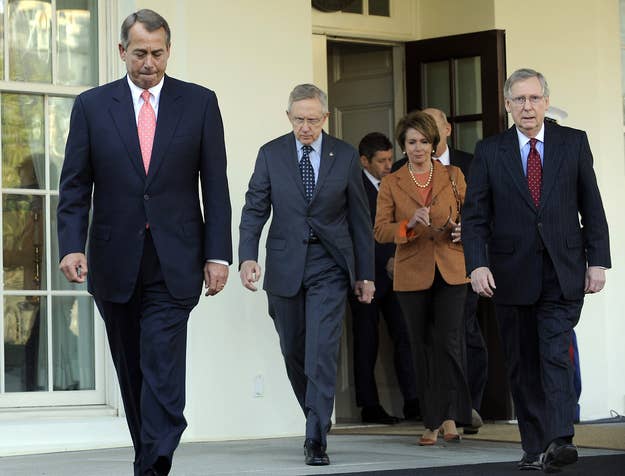
WASHINGTON, DC — Negotiations to avert the "fiscal cliff" started in earnest Monday as staff for House Speaker John Boehner and President Barack Obama met to hash out possible avenues toward a compromise.
Publicly, the week of Thanksgiving will be a quiet one on Capitol Hill and in Washington, with lawmakers having taken the time off for the holiday. But, behind the scenes, policy staff are working to prepare preliminary proposals to avert the "fiscal cliff."
On Monday, senior Republican leadership staff met with the Tax Relief Coalition and S-Corp Association, which, on behalf of small businesses, lobbied against tax hikes as part of a fiscal cliff solution.
"Small businesses are the backbone of our economy and employ the majority of Americans," said House Majority Whip Kevin McCarthy in a statement. "The president and Senate Democrats claim to care about job creators, but when they insist on raising tax rates, these are the very people they're hurting. I'm optimistic that we can find a way to avert the fiscal cliff through tax reform and responsible spending cuts, without crippling America's job creators."
Despite the brief public lull in fiscal cliff talks, the stakes remain as high as ever.
At the White House on Friday, Senate Majority Leader Harry Reid said top lawmakers of both parties would work with staff this week to hash out details of their plans, which will be discussed in further talks after Thanksgiving.
During those talks, congressional leaders and the president agreed that the biggest decisions about spending cuts, entitlement reforms, and tax-code changes will likely be addressed next year, after the fiscal cliff.
But, until then, lawmakers will need to agree on how best to prevent $500 billion in scheduled spending cuts and tax increases from going into effect. Democrats have argued that any solution must include revenue in the form of higher taxes for the wealthiest Americans; meanwhile, Republicans contend that sufficient revenue can be drawn from closing tax loopholes and reforming entitlement programs such as Medicare.
According to GOP aides familiar with the situation, one option that could come together before January would be a new restructuring of the sequester that pushes off final action for another year.
Like the last agreement reached during the debt-ceiling fight last year, the deal would include a “trigger” or “sequester” that would come into effect if Congress was not able to work out a comprehensive long-term solution before it expired.
But, in order for that to happen, Republicans will insist that any “trigger” include “serious pain” to be felt by Democrats on the entitlement front in order to force them into negotiations.
For its part, the administration is reportedly insisting that the short-term deal also address the debt ceiling increase that will be necessary by February.
As for any new sequester-type trigger, Democrats would again look for significant cuts to defense spending as well as mandatory tax increases on the wealthy and other provisions in order to force Republicans to the table.
It remains unclear whether a solution will be reached by the end of the year, however, and some Democrats have suggested that they would push the debate past the "cliff" in order to strengthen their position. So far, neither side has ceded ground in its demands.
